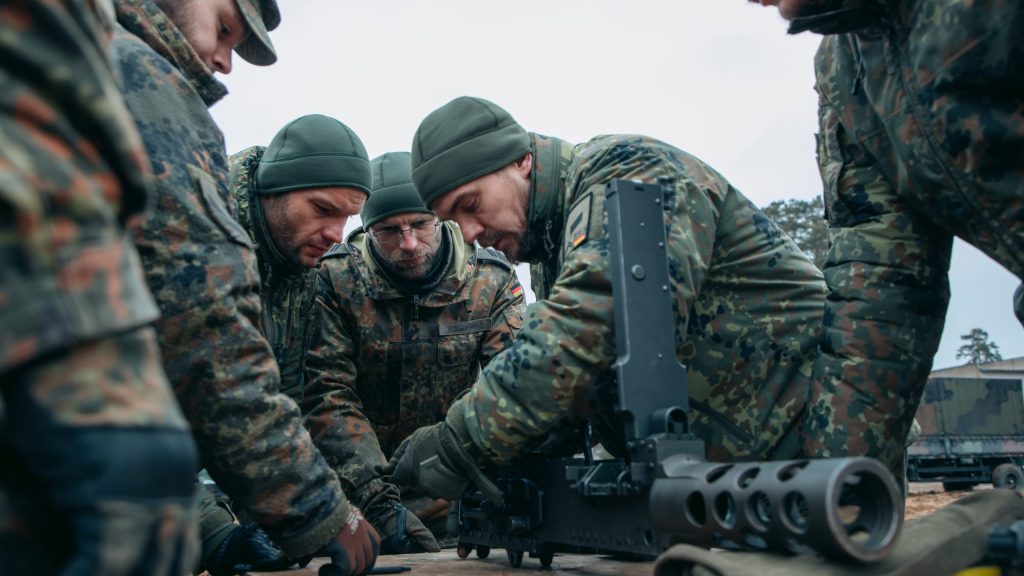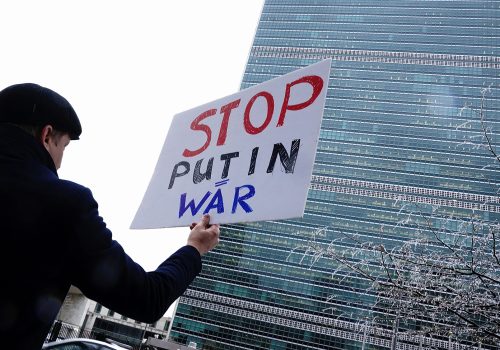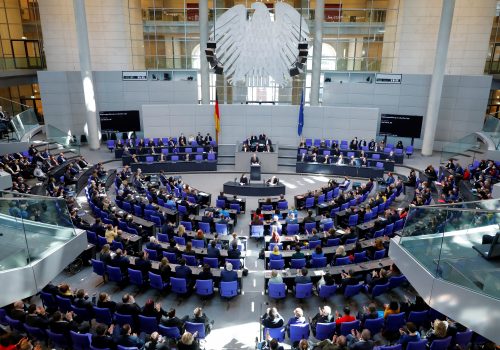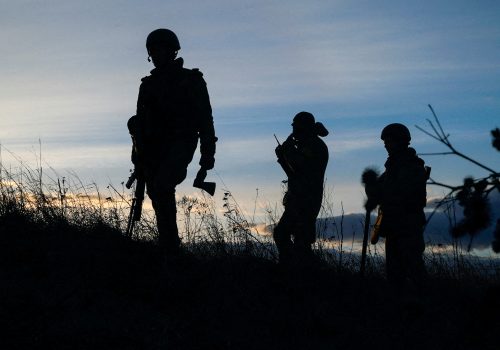Russia’s invasion of Ukraine has shaken Berlin out of a longtime geopolitical stupor and shattered the notion of reasoning with the dictator in the Kremlin. For too many years, naïveté and business interests have defined German foreign policy. Now, a range of German politicians are undertaking a rite of penance.
“I’m so angry at ourselves for our historic failure,” wrote former German Defense Minister Annegret Kramp-Karrenbauer. “After Georgia, Crimea, and Donbas, we have not prepared anything that would have really deterred Putin.”
As Putin’s tanks rolled into Ukraine, Alfons Mais, the German military’s chief of staff, publicly described his country’s army as “more or less bare,” with “extremely limited” options to support the NATO alliance. He never imagined he would have to experience a war, he added—in what was an incredible statement given that the very raison d’être of an army is being prepared for war.
Germany’s political establishment has failed to think in terms of raw power. There was a supercilious belief that other actors look at the world in a similar way. Europe might have replaced weapons with words—shooting instead with summits, so to speak—and the balance of power with the rule of law. But that doesn’t mean others, such as Moscow or Beijing, made such a shift.
In contrast, Putin’s historical essays and recent speeches demonstrate how deeply Russian imperialism and a Leninist who-kills-whom mindset define his thinking. Returning Russia to the top echelons of the global hierarchy is his ambition. Germany, oblivious to his vision, believed in the end of the Cold War and the inviolability of the post-Cold War order.
From Moscow, Putin sees a US president beleaguered by deep domestic divisions, a new German government finding its footing, a French president in an election campaign, and an embattled British prime minister. To him, the correlation of forces has changed in Russia’s favor. With a window of opportunity to change the world order to his liking, he has seized the moment.
From doing business to galvanized action
The late eleventh Marquess of Lothian, a British politician and diplomat, once observed that “peace comes from there being overwhelming power behind law.” But Germany hasn’t invested in such power or stood up for its convictions. With a swirl of naïveté, greed, conceit, and insecurity dominating its foreign-policy thinking, it has continuously refused to accept hard geopolitical realities.
Instead of constraining authoritarian powers, it aimed to do business with them—in spite of allegations or findings that such powers assassinated dissidents in the streets of London and parks of Berlin, or backed the hacking of the German Bundestag. Berlin has dragged its feet on the Nord Stream 2 pipeline, arms exports to Ukraine, and tougher financial sanctions.
The shock of Russia’s invasion and the immense pressure from allies and the German public has ultimately galvanized action. Berlin has put Nord Stream 2 on hold, authorized the export of weapons to Kyiv, and agreed to implement more tough sanctions, including barring some Russian banks from the SWIFT financial messaging network.
This is a sea change in German policy. Although the German Green Party, which helped make this significant shift, faces some risk with its base, this was a Kosovo 2.0 moment for party leaders—harking back to when they supported the NATO bombing of Serbia despite the party’s pacifism. This time, too, they jumped over their own shadow to be part of something bigger than themselves.
Last Sunday’s parliamentary debate was a historic moment. In a matter of hours, decades-old German policies had been overthrown in a major structural shift: Chancellor Olaf Scholz announced a one-hundred-billion-euro defense fund, anchored in the German Constitution, to upgrade the German armed forces and planned acquisitions of new atomic weapons-capable aircraft under NATO’s nuclear-sharing doctrine. He vowed to exceed NATO’s annual spending goal, build two liquefied natural gas terminals, and diversify Germany’s energy supply.
Ready to pay the price?
But when the dust settles, and the adrenaline and euphoria dissipate, a key question remains: Will this change last? Is it a long-lasting change of heart, or a short-term change of mind? The sea change of German foreign and defense policy is still wrapped in the fog of war. Germany seems ready to invest in geopolitical means, but will it also be ready to employ those means in the future and take political responsibility for the consequences?
“Today, geopolitical strength is determined not just by military and economic power but also by the capacity to endure pain,” wrote Ivan Krastev, a founding board member of the European Council on Foreign Relations. Exercising power exacts a cost—one that will be borne by German businesses and society and affect government popularity. Too often, Germany has been unwilling to pay the price.
Perhaps more importantly, what conclusions will Berlin draw for its overall future geopolitical orientation? How does Russia’s invasion impact Germany’s view of the world order? This is all relevant during a time when the European Union is developing its strategic compass, NATO a new strategic concept, and Germany a first-ever national security strategy. The latter should affect the development of Germany’s China strategy, given Beijing’s tacit complicity with Moscow.
Some members of the Berlin administration think the new crisis with Moscow will require better and more intensive relations with Beijing. Another set of players had argued for siding with Moscow to balance against Beijing: A month ago, then-German Navy chief Kay-Achim Schönbach said “we need Russia against China.” Is there enough internal support for the idea that Germany could, together with like-minded partners, oppose an autocratic axis of both Russia and China? Will Germany be able to simultaneously push back against Russia in the European theater and China in the Indo-Pacific?
For Germany’s new “traffic light” coalition, Russia’s invasion of Ukraine is a geopolitical baptism by fire. It must now position itself on difficult security issues of war and peace, and be prepared for the intense debates that will soon follow—not just within Germany’s political class, but also within German society.
Either way, Berlin cannot allow itself to fall asleep again.
Roderick Kefferpütz is a political analyst and member of the Atlantic Council’s US-Germany Renewal Initiative.
The views expressed in this article are solely that of the author.
Further reading
Fri, Feb 25, 2022
Not just Ukraine: Putin wants to remake the world
New Atlanticist By
We would be mistaken to hope that Putin's ambition is limited to Europe. Ultimately, it is the international liberal order and its norms that he is after.
Sun, Feb 27, 2022
Experts React: What’s behind Germany’s stunning foreign-policy shift?
New Atlanticist By
Our Europe Center experts weigh in on Germany’s about-face on military spending, arming Ukraine, and the Nord Stream 2 pipeline.
Sun, Feb 27, 2022
Ukraine has finally prompted the West to shift course on Putin
Inflection Points By Frederick Kempe
The Zelenskyy delegation’s chance to succeed in talks at the Belarus border with a Russian delegation would be far greater if Putin were confident that the West has Ukraine’s back.
Image: German soldiers are pictured maintaining their combat readiness in Lithuania on March 1, 2022. Photo by EYEPRESS via Reuters Connect



